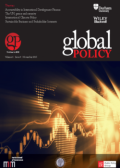
As countries negotiated a new climate agreement for the United Nations climate conference in December 2015, a groundswell of climate actions emerged as cities, regions, businesses and civil society groups act on mitigation and adaptation, independently, with each other and with national governments and international organizations. The Paris conference provided a historic opportunity to establish a framework to catalyse, support, and steer these initiatives. Without such a framework, ‘bottom-up’ climate governance runs the risk of failing to deliver meaningful results. Social science research highlights the need for a comprehensive approach that promotes ambition, experimentation and accountability, and avoids unnecessary overlaps. This article specifies functions and design principles for a new, comprehensive framework for sub- and nonstate climate actions that could provide effective coordination.
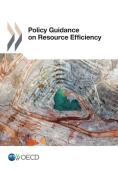
This report responds to the request by G7 Leaders at the Schloss Elmau Summit in June 2015, for the OECD to develop policy guidance on resource efficiency. Establishing a resource efficient economy is a major environmental, development and macroeconomic challenge today. Improving resource efficiency by putting in place policies that implement the principles of reduce, reuse, recycle (the 3Rs) is crucial to improving resource use, security and competitiveness while diminishing the associated environmental impacts.
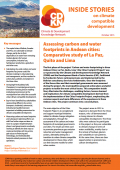
The capital cities of Bolivia, Ecuador and Peru are vulnerable to climate change, partly due to their dependence on water from retreating Andean glaciers for human consumption, industrial use, hydropower production, agriculture and other uses. This comparative study of La Paz, Quito and Lima highlights the challenges, enabling factors, lessons learned and implications for climate compatible development illustrated by a project to assess the cities’ carbon and water footprints.
Key findings include:
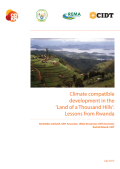
In the last decade, Rwanda has emerged as a leader in Africa for its efforts to integrate climate resilience and green growth into development planning and finance. This working paper charts some of the steps the Government of Rwanda has taken to become a leader in this area, namely:
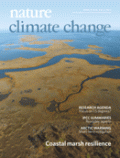
In the field of adaptation governance research, current discussion on the barriers to adaptation shows that theoretical explanations for why institutions emerge and how they enable or constrain adaptation are underdeveloped. In this Perspective, the authors show that there is a significant opportunity to advance the understanding of adaptation governance by integrating insights that have been developed in the extensive commons literature on the institutions that work to overcome social conflicts or dilemmas. 'Realist-materialist' approaches to understanding such collective action are particularly valuable to adaptation governance research because they emphasize how biophysical conditions give rise to certain types of social dilemma. Climate change affects these biophysical conditions, and thus may alter dilemmas or create new ones. Based on realist-materialist reasoning, this Perspective describes six types of dilemma, illustrates each with a case from the adaptation literature and draws on insights from the commons literature regarding relevant contextual conditions and effective policy instruments for overcoming social dilemmas.
